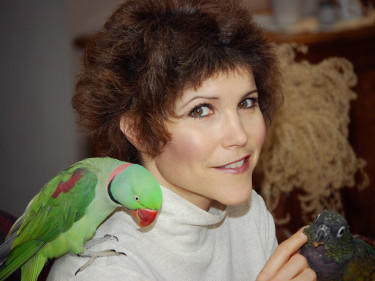I have heard the comment so many times: People want to get a bird that talks. I’d take a guess that it is probably the biggest reason why they get feathered companions, especially African greys. After all, there are so many funny parrot YouTube videos.
I live with two of these talking birds (one more so than the other) and I am the first to admit that there is something special about having a pet that speaks human. Barnaby, my Timneh African grey, is not shy about asking for his favorite food or calling for me.
Still, his talking ability was not the only reason I brought Barnaby into my home and I caution people against making that investment if it is the only reason. Here are some of my reasons why:
1. Birds live a very long time. If your pet is healthy, he can live many, many years. The larger the bird, the longer the lifespan. A macaw definitely has the potential to outlive you. Even an African grey or Amazon-sized bird can potentially live at least 30 to 40 years. Dreyfuss, my Pionus parrot, is about 23 years old now.
2. Birds need things to do. Remember, in the wild, they spend much of their days foraging for food. It is not enough to take them into your home and leave them in a cage without anything to do. They need enrichment activities that will vary depending on your individual bird. This means you will need to spend money and time giving them these opportunities. A bird that doesn’t have things to do will come up with his own choices. Here’s a video showing Barnaby’s choices :
3. Birds can be expensive and take up a lot of space. In addition to the cost of adoption, they should have a cage that allows for room to flap wings and move around. Cages are pricey. They will need quality food, toys, perches and veterinary care.
4. Birds are dusty. Many people do not realize this but birds have a lot of dust. If you are sensitive to this, that is something to consider. Some birds are dustier than others.
5. Birds make a mess. Many parrots will fling their food, toss their toys and make droppings wherever they happen to be. I keep a plastic sheet below Barnaby’s door when he first comes out in the morning as he (like many birds) has a huge morning dropping. Chester, my Alexandrine ringneck who died about five years ago, was an incessant chewer, which meant I had to help him fulfill that need (cockatoos share this trait). Often I’d roll up a newspaper or give him a phone book, and would later walk in to find confetti in and around his cage. He was well entertained but I was constantly cleaning up. (He was an amazing bird and worth it all to me.)
6. Birds vocalize. Whether or not they speak human, they also have the capacity to make loud noises and some birds are louder than others. As the rule goes with behavior, what is reinforced is repeated. This means if a scream produces a valued consequence for your bird, guess what he will do more often?
via Pet trainer: Some cautionary advice before taking a talking bird under your wing – Story.


